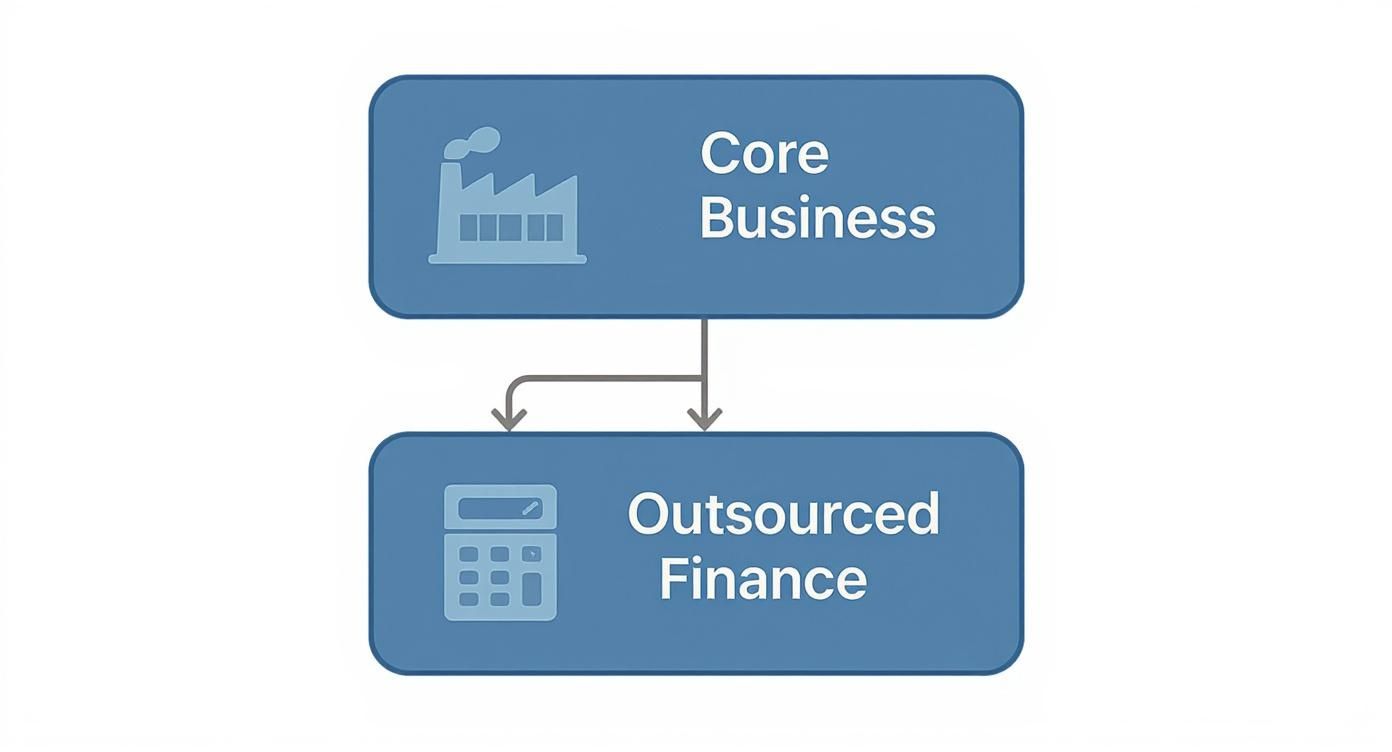When a business hands over some, or all, of its financial management to an outside firm, that’s financial outsourcing. This can be anything from daily bookkeeping to high-level strategic planning, giving a company access to specialist skills without the overheads of a full-time, in-house finance department. It’s a smart move for boosting efficiency, staying compliant, and freeing up your team to focus on what really drives growth.
What Are Financial Outsourcing Services, Really?
Think about renovating your house. You could try to be your own plumber, electrician, and builder, but it’s rarely the best way to get a great result. Financial outsourcing applies that same logic to your business. Instead of wrestling with every complex financial task yourself, you bring in a dedicated team of experts who live and breathe this stuff every day.
This is more than just offloading a few tedious jobs; it’s a strategic decision about how to manage your company's financial health. It’s like plugging a fully-formed finance department straight into your business, ready to go from day one. This external team takes care of the critical, time-consuming work that keeps your operations smooth and compliant.
Beyond Basic Bookkeeping
At its heart, outsourcing means delegating key financial duties. For many businesses, it starts with the essentials – the things that form the bedrock of financial stability. These foundational tasks often include:
- Daily Bookkeeping: Recording every transaction with pinpoint accuracy to keep your financial records crystal clear and up-to-date.
- Payroll Management: Making sure everyone gets paid correctly and on time, while navigating all the tax and compliance paperwork that goes with it.
- Accounts Payable and Receivable: Managing payments to your suppliers and chasing up customer invoices to keep your cash flow healthy.
But modern financial outsourcing services offer so much more. As your business scales, its financial needs become more complex, and a good outsourcing partner grows right alongside you. They can provide increasingly sophisticated support as you need it. To get a better feel for this, it's worth exploring what a complete outsourced financial function really involves.
By handing over financial management, leadership teams get back an incredible amount of time and headspace. They can shift their focus from putting out administrative fires to launching strategic projects that directly boost revenue and drive innovation.
A Strategic Partnership for Growth
Ultimately, the goal is to turn your finance function from a necessary expense into a powerful strategic asset. High-level outsourcing provides the kind of insights you need to make smart, forward-thinking decisions. This includes everything from detailed financial forecasting and budgeting to performance analysis that flags up growth opportunities and potential risks before they become serious problems. You can explore more about the different models in our complete guide to https://www.beyondhire.co/blog/accounting-and-finance-outsourcing.
This kind of strategic partnership ensures your company's financial engine isn't just ticking over – it's tuned for peak performance. It lets your core team concentrate on what they do best, whether that's delighting customers or building brilliant products, safe in the knowledge that your financial foundation is solid, compliant, and ready to support your biggest ambitions.
The Full Spectrum of Outsourced Financial Services
Thinking about outsourcing your finances isn't some big, all-or-nothing decision. It’s more like looking at a menu. You can pick and choose precisely what your business needs right now, and you can always add more later as you grow. By breaking down the different services on offer, you can quickly see where you’ll get the most bang for your buck.
This approach is becoming more and more common in the UK. In fact, a recent report found that 57% of UK organisations plan to increase their outsourcing in 2025, which is set to pump an extra £3 billion into the industry. Accounting and finance are right at the heart of this shift, with 21% of companies either dipping their toes in for the first time or expanding what they already send out. You can get the full story in Parseq's comprehensive 2024-2025 report.
This infographic is a great way to visualise how outsourced finance works as a specialist team supporting your main operations.

As you can see, it neatly separates your core business from the financial support functions. It shows how an external expert can slot in seamlessly to handle those critical money-related tasks, letting you get on with what you do best.
To help you figure out what's right for you, we've broken down the most common services into a simple table.
Matching Financial Services to Your Business Needs
This table gives you a starting point to match your current headaches with the right kind of professional support.
Transactional Foundations: The Daily Essentials
Every successful business stands on a foundation of accurate, consistent financial admin. These are the day-to-day, non-negotiable jobs that keep the lights on and the engine running. When you outsource them, you’re not just offloading tasks; you’re handing them to professionals who ensure they’re done with absolute precision.
Here’s what that typically covers:
- Bookkeeping: Think of this as the bedrock. Experts will meticulously record every single transaction, reconcile your accounts, and keep your financial records pristine. This gives you a crystal-clear, real-time view of your company’s financial health.
- Accounts Payable and Receivable: Cash flow is king. An outsourced team makes sure your suppliers are paid on time (keeping them happy) while also professionally chasing your invoices to get cash into the bank faster.
- Payroll Processing: Let’s be honest, payroll can be a nightmare of changing tax codes and regulations. A specialist provider makes certain your staff are paid correctly and on time, every single time, handling all the tricky compliance bits for you.
For many businesses, getting these fundamentals right is the first and most powerful step. You can dive deeper into the benefits in our guide to outsourcing bookkeeping services.
Compliance and Reporting: Staying Ahead of Regulations
Once your daily transactions are running like clockwork, the next level is about compliance and formal reporting. These are the tasks that keep you on the right side of the law and give stakeholders (like banks or investors) a clear picture of your finances. Getting this stuff wrong can lead to hefty penalties and seriously damage your reputation.
An outsourced partner effectively becomes your compliance guardian. They live and breathe the latest HMRC regulations and statutory rules so that you don't have to. The peace of mind this brings is often one of the biggest returns on your investment.
This area covers crucial jobs like preparing and filing your VAT returns, sorting out corporation tax, and producing your official year-end accounts for Companies House. It’s all about hitting deadlines with complete accuracy, taking that stress right off your plate.
Strategic Advisory: Driving Future Growth
This is where financial outsourcing gets really exciting. It moves beyond just recording what’s already happened and starts looking into the future. This is where an external partner transforms into a genuine catalyst for growth, giving you access to the kind of high-level financial brainpower that was once reserved for huge corporations with a full-time finance director.
These advisory services are all about helping you make smarter, data-driven decisions. They include things like:
- Cash Flow Forecasting: Building detailed models to predict where your cash will be in the coming months. This helps you spot potential shortfalls early or identify the best time to invest.
- Budgeting and Performance Analysis: Working alongside you to set realistic budgets and then tracking how you’re doing against them, offering insights to help you spend smarter and boost profits.
- Virtual CFO (vCFO) Services: This gives you board-level strategic advice on everything from fundraising and risk management to major business decisions, all without the six-figure salary of a full-time CFO.
This top tier of service turns your finance function from a simple cost centre into a powerful engine for building a stronger, more profitable business.
Why Smart UK Businesses Are Outsourcing Their Finances

What makes so many UK companies decide to hand over their financial operations to a partner? It's not just about getting tasks off the to-do list. It’s a strategic decision that turns the finance function from a costly administrative chore into a powerful asset that fuels real growth.
The whole thing usually starts with a simple question: "Are we really making the best use of our resources with our current setup?" For a fast-growing number of businesses, the answer is a firm "no." They're discovering that financial outsourcing services offer a much smarter, more agile way to manage their money, stay compliant, and plan for the future.
This isn't a niche trend; it's a major shift in how British businesses operate. The UK outsourcing market is on track to hit an incredible $387.3 billion by 2030. This boom is largely down to increasingly complex regulations and the constant need for real-time financial insights—exactly what specialist partners are set up to deliver.
Slash Your Costs Dramatically
One of the most powerful draws of outsourcing is the immediate and significant cost savings. When you hire an in-house finance team, the salary is just the beginning of the story. You also have to factor in National Insurance contributions, pension schemes, hefty recruitment fees, training days, and the subscriptions for specialised accounting software.
Believe it or not, these extra costs can easily add 25-40% on top of the base salary for every single employee. Outsourcing sweeps away this complicated and unpredictable cost structure, replacing it with one clear, predictable monthly fee.
Think about it this way: by partnering with an external provider, you get an entire team of specialists for what can often be less than the cost of hiring just one senior financial controller. This model gets rid of all the hidden expenses and makes budgeting refreshingly straightforward.
This predictable cost model doesn't just cut your overall spending. It also massively improves your cash flow management, freeing up capital to invest in the parts of your business that actually generate revenue, rather than just supporting the back office.
Get Instant Access to Top-Tier Expertise
When you hire one financial manager, you get one person's knowledge. But when you engage with financial outsourcing services, you tap into an entire department's worth of expertise from day one. Suddenly, you have a diverse team of specialists on your side, without the time-consuming and expensive process of trying to recruit them all yourself.
This collective brainpower covers all the bases you could possibly need:
- Tax Specialists: People who live and breathe the latest HMRC regulations, ensuring you’re as tax-efficient as legally possible.
- Compliance Officers: Your safeguard against fines and penalties, making sure every report is accurate and filed on time.
- Strategic Advisors: High-level thinkers who can provide the forecasting and cash flow analysis needed to make critical business decisions with confidence.
- Accounts Receivable Professionals: Experts whose only job is to get your invoices paid faster, which directly improves your cash flow. If this is a major headache for you, our detailed look at account receivable outsourcing offers some specific solutions.
For most small or medium-sized businesses, building a team with this breadth of knowledge in-house would require an astronomical budget.
Scale Effortlessly and Sharpen Your Focus
Business is never a straight line. You might hit a period of explosive growth, face a seasonal lull, or decide to pivot your entire model. An in-house finance team is rigid; scaling up means a slow hiring process, and scaling down is often impossible.
Outsourcing, on the other hand, offers incredible flexibility. As your transaction volume shoots up, your provider can seamlessly assign more resources to your account. If things slow down, you can simply scale back your service package. This agility means your finance function is always the perfect size for your business right now, so you never overpay for capacity you aren't using.
But perhaps the single greatest benefit is the freedom it gives back to you and your leadership team. Instead of getting bogged down in managing payroll, chasing invoices, or battling with spreadsheets, you can pour all that energy back into what really matters: innovating for your customers and driving the core activities that grow your business. That renewed focus is often the key that unlocks the next level of success.
How to Choose the Right Financial Outsourcing Partner

Choosing a partner to look after your company's finances is a huge decision. You’re not just hiring another supplier; you’re building a long-term relationship based on trust, expertise, and a shared vision for your business.
Get it right, and your outsourcing partner can become a massive asset, fuelling your growth. Get it wrong, and you could be facing a world of frustration and costly mistakes. To make the best choice, you need a solid framework for sizing up potential providers, moving beyond the sales pitch to really understand what they bring to the table.
Evaluate Their Industry Experience
The very first question you should ask is simple: do they get your world? A firm that’s already worked extensively in your sector—whether that’s tech, retail, or professional services—will know the landscape. They'll be familiar with the common financial hurdles, regulatory quirks, and unique challenges that define your industry.
This is especially critical in heavily regulated fields. For instance, the banking sector has seen outsourcing spend steadily climb from 6.8% in 2022 to 7.2% in 2023, a trend driven by the need for partners who are experts in deep compliance and risk management. A generalist provider just can't offer that level of specialised insight.
Assess Their Technology and Systems
Today, technology is the engine room of any efficient finance function. The tech stack your potential partner uses needs to sync up with yours, not cause headaches. Don’t be afraid to ask them directly what accounting platforms they use—like Xero or QuickBooks—and make sure they are genuinely proficient.
More importantly, find out how you’ll get access to your own financial data. A great provider does more than just email you a report at the end of the month. They should offer real-time dashboards and analytics, giving you a live view of your company's financial health. This visibility means you can make sharp, informed decisions based on what’s happening now, not last month.
The right technology turns financial data from a historical record into a forward-looking strategic tool. Ensure any potential partner can deliver this level of insight and integration smoothly within your existing operational workflow.
Scrutinise Credentials and Client Reviews
In the world of financial outsourcing services, reputation is everything. It’s time to do your homework. Start by checking their professional accreditations. Are their accountants chartered? Do they hold certifications that prove their commitment to maintaining high standards?
Next, look for social proof. Ask them for case studies or testimonials from clients who are in a similar industry or around the same size as your business. Reading independent reviews can also give you an unfiltered look at their strengths and weaknesses. It's also vital to use official verification tools; for example, you can verify FSP providers to confirm their legitimacy.
Prioritise Cultural Fit and Communication
Finally, never forget that this is a partnership. The technical skills are non-negotiable, but a good cultural fit and clear communication are what will make the relationship work in the long run. Pay close attention to their communication style during your initial calls.
Are they proactive and clear, or are you left chasing them for answers? Do they take the time to explain complex financial ideas in plain English? This team is about to become an extension of your own, so you need to feel confident that they’re approachable, responsive, and truly invested in your success. A personality clash here can create friction that gets in the way of everything else.
Stepping Around the Pitfalls of Financial Outsourcing
Bringing an external finance team on board can be a game-changer, but a great partnership is about more than just a signature on a contract. The smartest way forward is to understand the potential bumps in the road from the very beginning and build a relationship designed to avoid them.
If you tackle the common worries head-on, you can make sure your move into financial outsourcing services is built on solid ground, with trust and transparency from day one.
"Will I Lose Control of My Finances?"
It’s a natural fear. You're handing over the keys to a critical part of your business. But here’s the thing: a good outsourcing partnership should give you more financial clarity, not less. The myth of losing control only becomes a reality when expectations aren't set properly from the start.
The right provider acts as a true extension of your team. They’re there to provide deeper insight, not to leave you in the dark. To make sure you’re always in the driving seat, you need to insist on a clear communication framework.
Here’s how to keep a firm grip on the reins:
- Set Crystal-Clear Expectations: Be specific. Tell them exactly what you need, whether it's weekly reports or tracking very particular key performance indicators (KPIs).
- Insist on Regular Reporting: A decent partner does more than send a summary at the end of the month. Ask for access to real-time financial dashboards and lock in regular meetings to talk through performance and plan ahead.
- Agree on Communication Channels: How will you talk? Decide on your primary contacts and the best way to get updates, be it a shared Slack channel, scheduled calls, or a project management tool.
When you take this approach, it stops being a simple transaction and becomes a real collaboration where you always know exactly where you stand.
"What About My Data Security?"
Handing over sensitive financial information demands total trust in your partner’s security. In a world where cyber threats are a constant worry, this is one area where you can't afford to compromise. Any provider you consider must show you they have a rock-solid commitment to protecting your data.
When you're checking out potential firms, don't be shy. Ask them directly about their security setup. They should be able to walk you through their data encryption, who has access to what, and what their disaster recovery plan looks like. Crucially, they must be fully compliant with UK regulations like the General Data Protection Regulation (GDPR).
A financial outsourcing partner you can trust will be an open book about their security. If a firm gets vague or brushes off your questions about data protection, see it as a massive red flag and walk away.
"Are There Hidden Costs I Don't Know About?"
The last major hurdle to watch out for is the dreaded surprise invoice. That attractive initial quote can easily inflate if the agreement is poorly defined or doesn't actually cover what you need. Real value for money comes from total transparency in pricing, not just a low number on a proposal.
Before you sign anything, go through the service level agreement (SLA) with a fine-tooth comb. Look for a detailed list of what's included in your fee and, just as important, what isn't.
A reputable firm will be upfront about any extra charges for work that falls outside the original scope. This clarity means no nasty surprises, allowing you to budget properly and build a partnership where everyone is working towards the same goal.
Your Financial Outsourcing Questions Answered
Thinking about handing over your company’s finances is a big deal. It’s a move that naturally brings up a lot of questions, and you need clear, honest answers before you can feel comfortable. We’ve pulled together the most common things business owners ask us, cutting through the jargon to give you the information you need to decide with confidence.
This isn’t about making vague promises. It’s about getting practical clarity on what it costs, whether your business is ready, and what the handover process actually looks like. Once you understand these key areas, the idea of financial outsourcing services becomes much less intimidating and starts to look like the smart, practical solution it is for so many businesses.
How Much Do Financial Outsourcing Services Cost?
There’s no one-size-fits-all price tag because the service is built around what your business actually needs. That said, the pricing models are usually very clear and predictable. For the basics, you might start with a monthly retainer that covers your day-to-day bookkeeping and transaction management. This just makes sure your records are always accurate and up-to-date.
As you need more support, good providers offer different packages. These could add in full accounting services like managing your VAT returns, running payroll, and creating management reports. For businesses that need high-level guidance, there are premium options that include strategic support like cash flow forecasting or virtual CFO (vCFO) services. The key is that a trustworthy partner will always give you a detailed quote based on your transaction volume, complexity, and the exact services you choose, so there are no nasty surprises down the line.
Is My Small Business Ready for Financial Outsourcing?
Absolutely. In fact, it’s often small businesses and ambitious start-ups that get the most out of it. It’s a common myth that you have to be a certain size to outsource, but really, it's the other way around. Outsourcing gives you instant access to a level of financial expertise that would be completely out of reach if you tried to hire someone full-time.
Think of it as putting a professional, scalable finance department in place from day one. You get seasoned experts handling your compliance and financial planning, which frees you up to pour all your energy into building your product and finding customers. It’s a structure built for growth, ensuring your financial operations won’t crumble as your business gets bigger and more complex.
The real question isn’t whether you're ready, but whether you can afford not to have expert financial oversight. For a growing business, getting this right early on prevents costly mistakes and builds a solid platform for future success.
How Difficult Is It to Switch to an Outsourced Provider?
This is a worry for almost everyone, but a good provider has this down to a fine art. Their whole job is to manage the switch for you with as little disruption as possible. They have tried-and-tested systems designed to make the entire process feel surprisingly smooth.
Typically, the transition follows a simple, structured path:
- Initial Discovery: They'll start by getting to know your business inside and out—your current processes, your challenges, and what you want to achieve.
- Systems Review: Next, they’ll take a look at your existing software and accounts to map out the best way to migrate everything over.
- Secure Data Migration: This is where they securely and confidentially transfer all your financial information to their own systems.
- Clear Onboarding: Finally, they’ll walk you through a proper introduction to your new team, show you how to use their reporting dashboards, and set up clear lines of communication.

